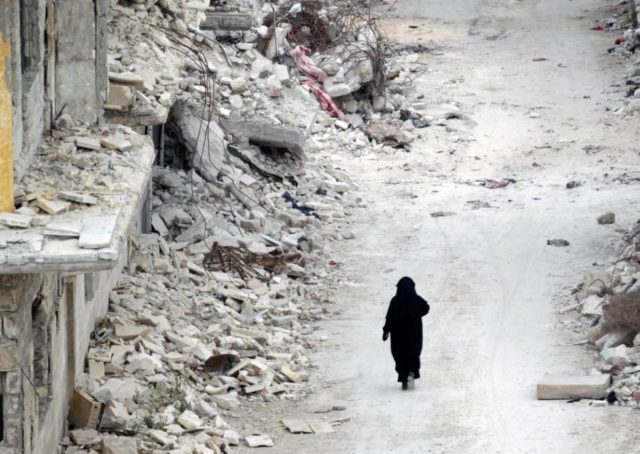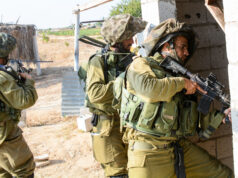
Editors Note: The Trump administration is ending the CIA program, initiated in 2012, to train and equip members of Syrian so-called “moderate” rebel groups. It is not so much a “gift” to Russia as recognition that the rebels have been ineffectual because a) the U.S. (and Britain) didn’t give them enough military aid to “win,” and b) the U.S. was ambiguous about what constituted “winning.” There is still no clear goal in U.S. policy for Syria.
We were prompted to look back at JPC’s view of rebel funding and Syria policy from the beginning and believe the following excerpts remain timely.”
Facing the Brutal Reality of American Syrian Policy
June 2012
…Kofi Annan said that without regime change, “[t]he future [emphasis added] is likely to be one of brutal oppression, massacres, sectarian violence and even all-out civil war.”
Still thinking that the “future” can be avoided, Annan has a new plan involving asking Iran to intercede on behalf of the Western powers. The U.S. promptly objected, guaranteeing time for new fighting while the Western powers fight among themselves…
The most likely outcome of a minority dictator (al-Assad) supplied with arms (Russia, China, Iran, and North Korea) and political support (Russia, China, and Iran) in an existential battle with the majority population (Sunnis) is continued killing until the majority is cowed. To that extent, Annan’s “future” is now, and this week’s massacres are part of that process.
While asking Iran for help is a non-starter, asking Russia is not. But hoping the Russians will stop the carnage and remove al-Assad in exchange for international recognition of Syria in Russia’s sphere of influence begs the question. Russia already has Syria in its sphere of influence, and al-Assad appears to have borrowed a page from the Russian handbook in Chechnya, where “kill them, level them, and kill their children” was the operative motto…
Al-Assad has a long way to go before the West can assume Russia will act on a humanitarian impulse that overrides a strategic Russian interest.
The forecast, then, is for more fighting — and more hand-wringing. Mrs. Clinton said a few months ago that she is “incredibly sympathetic to the calls that somebody do something” but that “sometimes, overturning brutal regimes takes time and costs lives. I wish it weren’t so.”
To offer verbal support for “overturning a brutal regime” without providing the wherewithal ensures prolonged, agonizing fighting without hope of a successful ending. The rebels can’t small-arm and IED their way to victory. If there is no workable plan for an achievable victory, at what point should military and civilian losses be cut? That is the precise — and divisive — question for the coalition in Afghanistan. To fail to ask it about the Syrian rebels is leading precisely to the broader instability the West claims to worry about…
Israel faces the possibility that Hezb’allah will acquire parts of Syria’s chemical and biological arsenal — it already has missiles. The U.S. has openly discussed drawing up a plan for limited military action to secure Syrian non-conventional capabilities if necessary. One can assume that the IDF has drawn up a similar — though perhaps not coordinated — plan and will execute it if necessary. Beyond that, Israel may be relieved to have so many of its adversaries (Iran, Hamas, Hezb’allah, Syria, and Lebanon) fighting each other.
Iran is fighting in Syria on behalf of the regime, an indication of its strategic interest in the preservation of al-Assad and his heterodox Shiite minority. The Muslim Brotherhood and al-Qaeda are also there, fighting for the replacement of the regime with a Sunni fundamentalist government.
Which leads finally to the question: what is the strategic imperative of the United States and the West?
If the priority is to stop Iran’s quest for regional hegemony as well as its quest for nuclear capability, the removal of its primary regional ally would be crucial, and direct military action would be warranted. Even a Muslim Brotherhood-associated government would be preferable to al-Assad then, because it would not be aligned with Iran.
If the removal of the current Syrian regime does not rise to the level of a strategic imperative, then the Western interest should be in protecting its friends — Israel, Jordan, Turkey, and Lebanon — from the fallout.
###
Obama Trying to Buy Allies in Syrian Revolution
August 2012:
The theory is that other countries/people would be more like us if a) they had a chance to be and b) they had the money to be. This meshes with our desire to have political and military influence in various places. But a quick survey of administration outreach to Iran, Egypt, Syria, the Palestinian territories, and Pakistan as well as the Taliban shows that the commitment of American troops, money, and/or political support has not resulted in a string of Western friends.
A more realistic policy would understand:
- They already know how to kill. Our training and equipment may enable them to do it better, but with no guarantee that they will adopt our enemies as their own, or adopt Western human rights principles/practices.
- A brush with Western-style politics will not “moderate” previously immoderate people. The corollary is that they may adopt the rhetoric of democracy in English to receive benefits from the West, but they lie.
- Corollary 2: elected radicals are not closet democrats, closet moderates, closet believers in the legitimacy of Israel, closet admirers of Western rights, civil liberties, and freedom of conscience.
The “pothole theory” says people who win elections have to keep the approval of the people to be reelected — thus, they have to pay attention to economic policy and good governance. But that’s only if they plan ever to run in another election. Hamas had one, and Abu Mazen had one — neither wishes to go again. Without American support, Iraq may have difficulty with another free, multiparty election as well. Post-electoral governance in Libya and Tunisia is not quite as liberal as it was touted to be.
- Other corollary: American military and economic aid do not equate to political influence. The U.S. spent more than 4,000 American lives and billions of dollars ousting a dictator and trying to turn Iraq into a functional state — and we did better than some said we could. But our influence left with our troops. Western Iraq hosts al-Qaeda again, killing Iraqi Shiites and crossing the border into Syria to aid the rebels, and Ali Mussa Daqduq is a free man.
###
Training Syrian Rebels to Conquer the Golan Heights and Shoot Down Israeli Aircraft
March 13, 2013
American assistance is supposed to go only to “moderate” rebels, but arms have been flowing freely, paid for by American “allies” Qatar and Saudi Arabia and moving through Turkey. Recently, a source with ties to Israeli intelligence claimed that a supply line has been running from Bosnian extremist groups, outside the control, influence, or even vision of the U.S. and its allies. Libya and al-Qaeda in Iraq have also been conduits for weapons to rebel militias, and last week, 48 Syrian government soldiers and officials were killed in Anbar Province, an al-Qaeda stronghold.
Israel expects to see any and all weapons, including some of the estimated 15,000 surface-to-air missiles the U.S. admits “disappeared” from Libya, aimed in its direction…
It was Israeli intelligence reports that Assad was moving his chemical weapons that first brought American Special Forces to Turkey and Jordan in 2012, hoping to train Syrian rebels to secure the arsenal before Assad or Hezb’allah moved it to Lebanon or used it. The irony of planning to entrust chemical weapons capability to rebels to whom they wouldn’t give guns appears to have escaped the Americans.
British papers report that the U.S., Britain, and France are now working together with high-ranking Syrian defectors at the King Abdullah II Special Operations Training Center near Amman. EU guidelines on the Syrian arms embargo allow military training as long as the aim is “the protection of civilians.” This is nebulous at best, harking back to “Responsibility to Protect” (R2P), the announced basis of American intervention in Libya. Only this time, we’re apparently training Syrians to do the protecting, raising the question of what weapons they will use, since the U.S. doesn’t yet admit to providing any.
The United States, France, and Britain claim to be training their own Syrian rebel force, either to help overthrow Assad or to help ensure a peaceful transition after he’s gone. But there’s that pesky weapons question again. Whether the rebels are supposed to kill government soldiers, or be prepared to kill “jihadists” after the war to prevent a jihadist government, with what are they supposed to do it?
Is the U.S. honestly sure our “moderate” rebel friends aren’t using the al-Qaeda pipeline on the side? Or are we cynically sure they are? If the former, what makes us believe they will be able to defeat al-Qaeda-related groups after the revolution? And if the latter, what makes us think they will want to?
Israel, not for the first time, will be left to cope with a situation born of the inability of its neighbors to fashion a tolerant society and the failure of the West to understand and protect its interests and its friends.
###
What Outcome Do We Seek in Syria?
August 22, 2016
There is no easy side for America to take — if we take any. On one side is a war criminal, whose allies are Russia, Iran, and Hizb’allah (a U.S.-designated terrorist organization). On the other is the “opposition,” a collection of fighters including Jabhat al-Nusra — until last week calling itself an arm of al Qaeda — the Free Syrian Army, ISIS-affiliated rebels, and groups with acronyms previously unknown. Some will fight ISIS. Some are ISIS. Some will fight only Assad. Just about all are Sunni Islamists supported financially by America’s erstwhile allies in the Gulf plus Turkey. Among the Kurdish groups, some are Assad’s allies; some are America’s allies. All are the enemy of Turkey, a NATO member.
Our allies have their own agendas, as do our adversaries.
The Iran-Russia axis anchors the ends of the Shiite Crescent from Iran across Iraq, Syria, and Lebanon, ending in the Mediterranean. The Crescent is an Iranian goal that threatens a variety of countries on its periphery, including Israel and Turkey. Russia’s goals include 1) maintaining a friendly government in Damascus that will permit Russian bases at Tartus and Latakia, 2) broader military access to the region, and 3) status as “go to” power as the United States withdraws its influence. Partnership in the Shiite Crescent ensures all three.
Washington has been trying to find a way to cooperate with Russia in Syria without acknowledging that Russia’s goals, and Iran’s, are inimical to the president’s insistence that Assad has to go. The Washington Post reminded its readers this week of Mr. Obama’s words in 2012. “With allies and partners, we will keep increasing the pressure, with a diplomatic effort to further isolate Assad and his regime, so that those who stick with Assad know that they are making a losing bet.”
Has the president changed his mind? Does he now believe the Russians and Iranians together can impose some sort of brutal stability on the region, and their dominance would be in our interest?
The longer the fighting goes on, the more casualties there will be — including civilian casualties. In a country where an estimated 470,000 people have already been killed, the numbers are horrific. The United Nations believes 1 in 10 Syrians have been killed or wounded since 2012; the American equivalent would be 32,400,000 people.





